SLIPPERY SWINNEY
31 January 2025
John Swinney says one thing in public, but does quite another in private.
During last year's general election campaign, a statistic used by Rishi Sunak in the ITV leaders debate became highly controversial. It emerged that the Permanent Secretary to the Treasury had warned ministers not to mislead the public by presenting the figure as having been produced by Treasury civil servants.
Speaking to the media in the aftermath of this episode, John Swinney castigated Sunak for disregarding civil service advice, and was emphatic that he would never do such a thing:
“And speaking personally, if I had received a letter from the Permanent Secretary of the Scottish Government, telling me not to use information in a particular way, because it created that misleading impression, I would not have used it. Because that’s not what you do when you’re a senior political leader.”
You can watch Swinney saying these words here (he was speaking on 7th June 2024):
Some chutzpah, you might think, given the SNP's track record with dodgy statistics.
And you'd be right to be sceptical. Newly uncovered correspondence, obtained via Freedom of Information, reveals that just 10 days before Swinney made that emphatic statement, he had rejected civil service advice to correct the Official Report of the Scottish Parliament, after misleading it with a false statistic.
The false statistic in question is a familiar one. Over recent years Scottish Government ministers have repeatedly claimed that 100% of electricity consumed in Scotland is generated from renewable sources. There is no truth to this - it has been thoroughly debunked by independent fact checking organisations1https://fullfact.org/economy/snp-sturgeon-blackford-swinney-renewable-energy/ and the UK Statistics Authority has rebuked the Scottish Government for misleading the public.2https://uksa.statisticsauthority.gov.uk/correspondence/sir-robert-chote-to-stephen-kerr-msp-renewable-energy/
The correspondence reveals that John Swinney was advised by officials to correct the record after using the false statistic during FMQs, but he rejected that advice and declined to make the correction. One official was so concerned by Swinney's behaviour that it was flagged to the Scottish Government's Chief Statistician, and the UK Statistics Authority also became involved. Ultimately, John Swinney was forced to send letters of correction. But he could not formally correct the Official Report because his intransigence meant the time limit for corrections had elapsed.
Timeline
At FMQs on 23rd May 2024, John Swinney made the following statement, in response to a question from Lorna Slater:3https://www.parliament.scot/chamber-and-committees/official-report/search-what-was-said-in-parliament/meeting-of-parliament-23-05-2024?meeting=15878&iob=135562#orscontributions_M2098E385P721C2591111
“When we came to office, around 20 per cent of Scotland’s electricity consumption came from renewable sources, but that has now reached 113 per cent.”
Using a Point of Order, Liam Kerr noted that the First Minister’s statement was false, and challenged him to make a correction.4https://www.parliament.scot/chamber-and-committees/official-report/search-what-was-said-in-parliament/meeting-of-parliament-23-05-2024?meeting=15878&iob=135587#orscontributions_M5651E325P814C2591334
Correspondence obtained through Freedom of Information reveals that civil servants then spent several days discussing the appropriate way to correct the record.5https://www.gov.scot/publications/foi-202400425188/
An (unnamed) official could not hide their frustration at how often this was happening, saying: “another issue is that this particular statistic has been repeatedly misrepresented in the same way by ministers before. This resulted in an investigation by the UK Statistics Authority which looked at how the statistic was used by ministers; as well as multiple FoI requests.”
![/image/IMG_6361[1].jpeg](/image/IMG_6361[1].jpeg)
On 29th May 2024, the First Minister’s Private Office complained that it had only just been informed that a correction would be required. It also expressed concerns about the government repeatedly “misrepresenting the facts”. The email ended on an exasperated note: “Alternatively, we don't use these stats any more.”
![/image/IMG_6363[1].jpeg](/image/IMG_6363[1].jpeg)
Later that day, officials wrote to the First Minister, advising him to make a correction, and suggesting the appropriate wording.

On 30th May 2024, exactly a week after the FMQs exchange, things took a remarkable turn. The Principal Private Secretary to the First Minister wrote to officials, informing them that John Swinney had rejected their advice. Swinney didn't see what the problem was: “As such, he does not believe that the record should be corrected.”
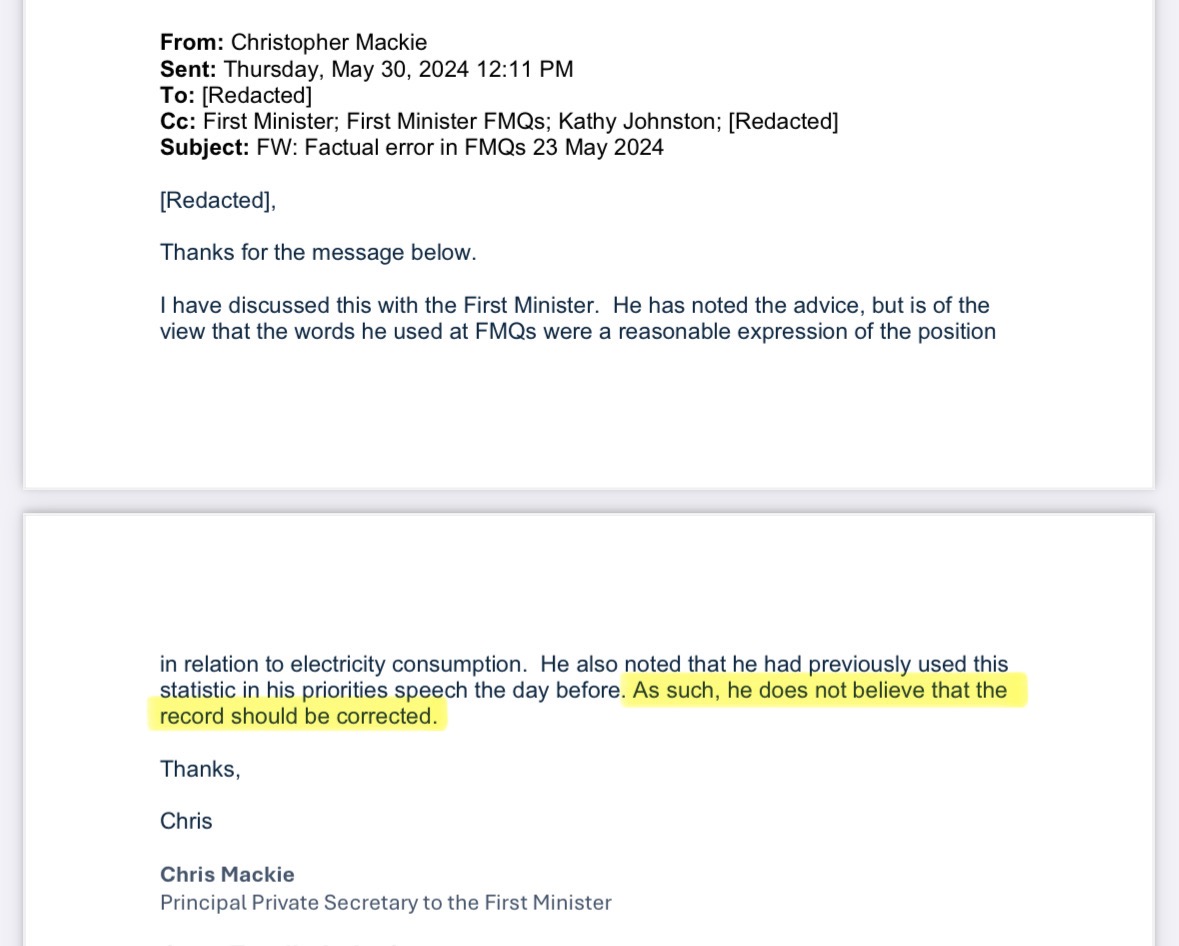
On 3rd June 2024, an unnamed official (presumably the same one who wrote the first item of correspondence quoted above) sent an email expressing “concern” about the First Minister’s response, and indicating that they had informed the Scottish Government’s Chief Statistician.
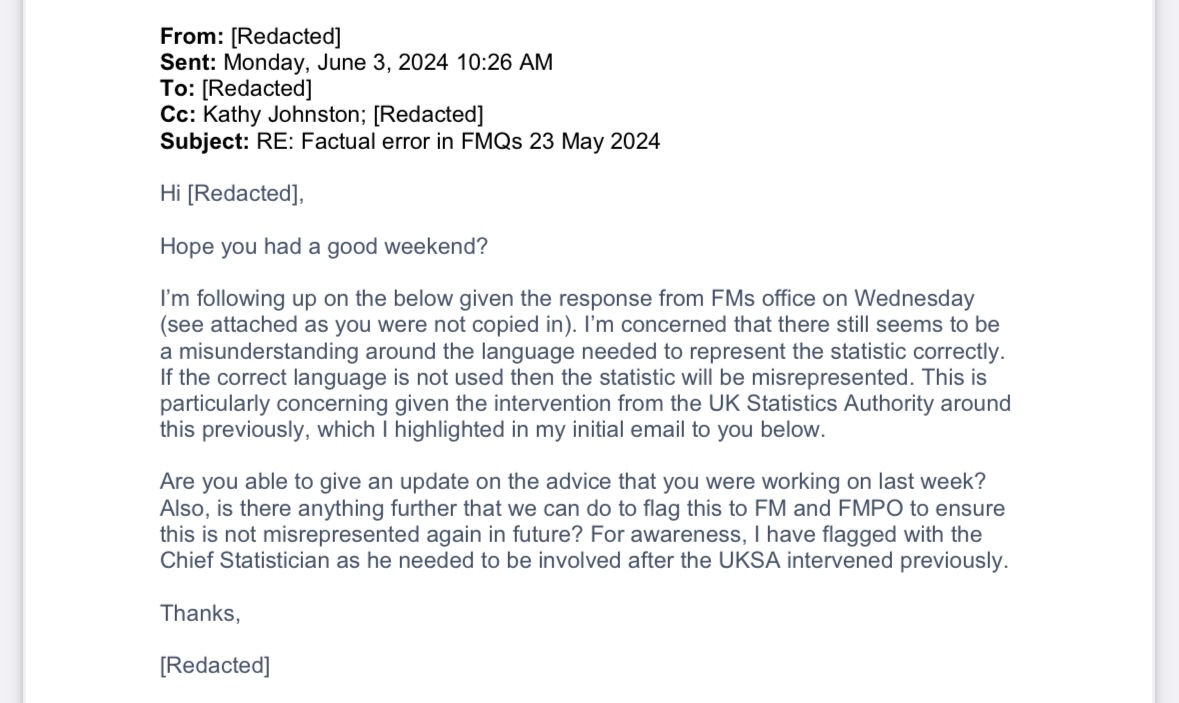
It took the Chief Statistician (Ally McAlpine) more than 3 weeks to give his opinion. On 25th June 2024 he wrote to John Swinney to tell him that a correction was necessary.
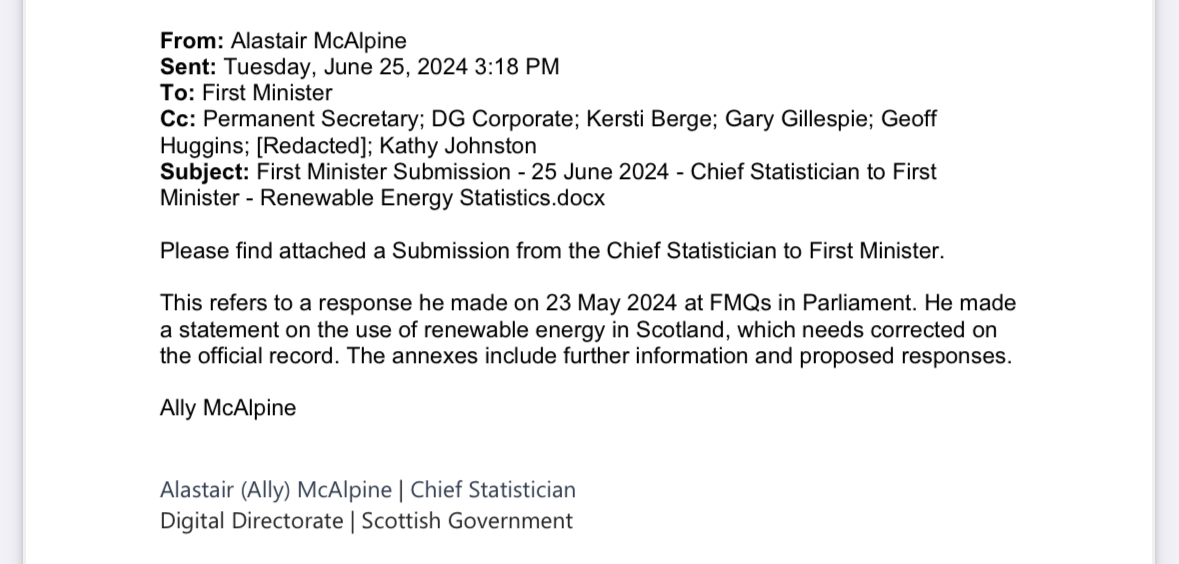
Why did it take the Chief Statistician so long to deliver what should have been a straightforward and obvious message? A clue is provided in one of the annexes mentioned in the above email.
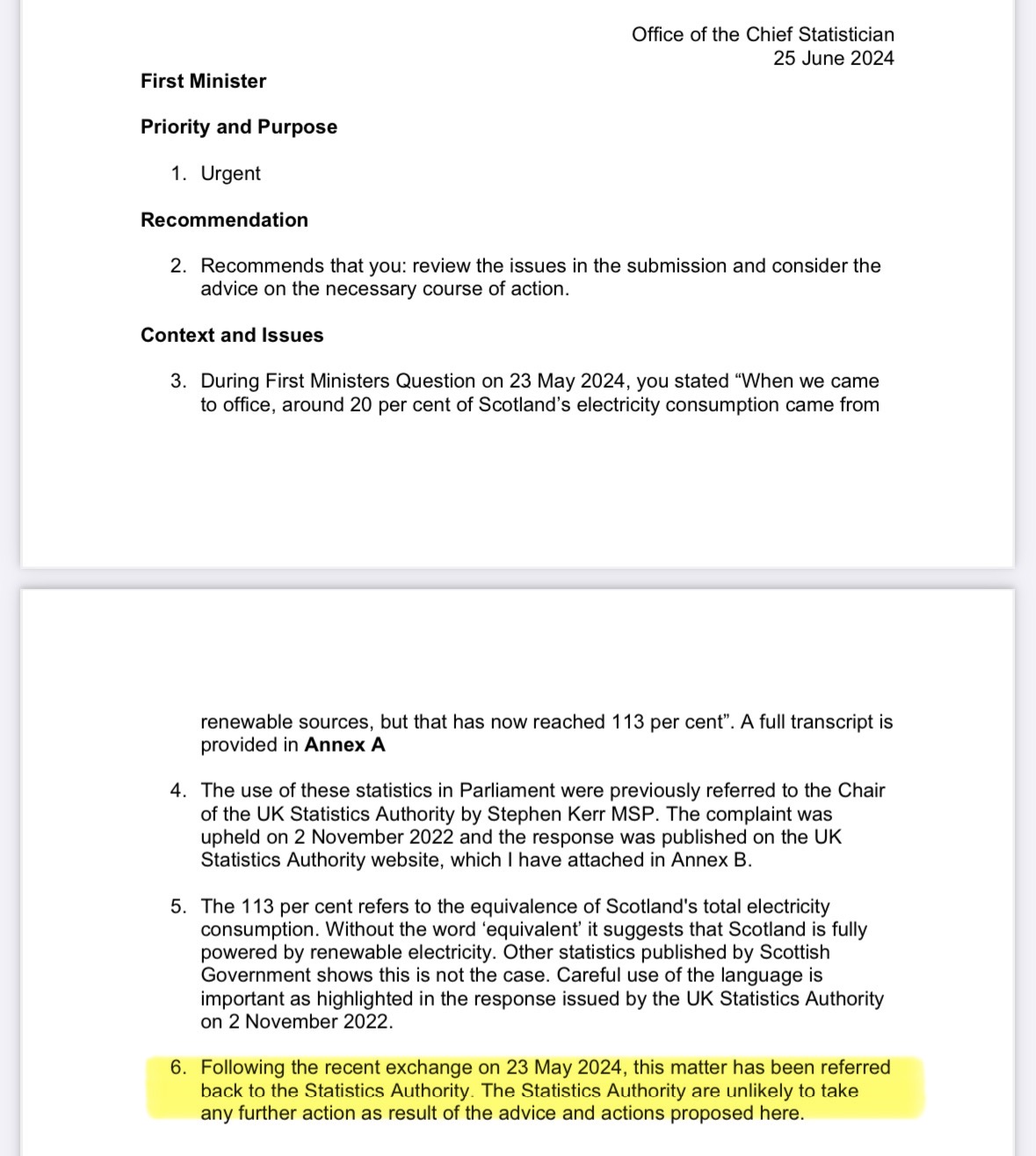
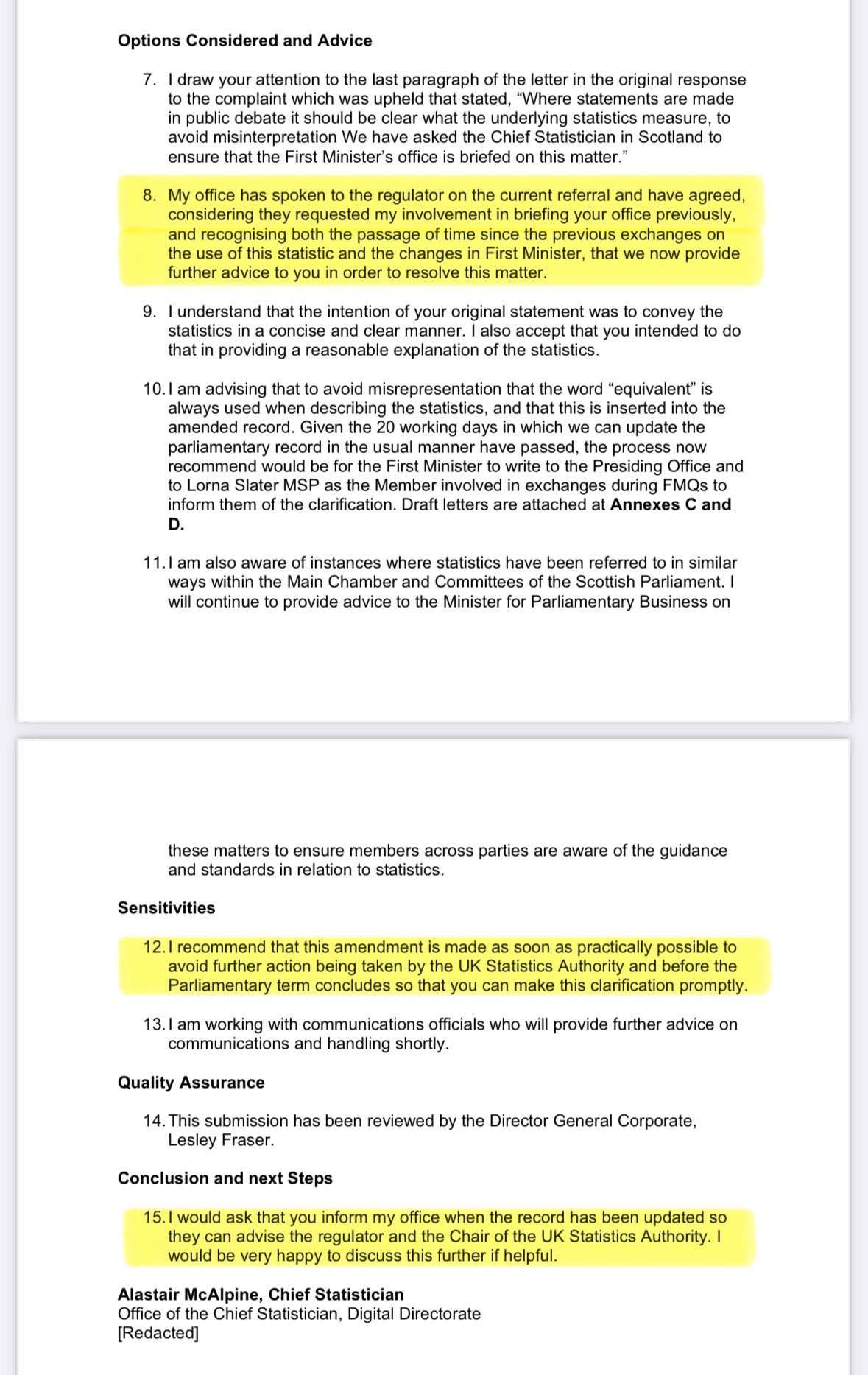
The UK Statistics Authority had clearly been in touch with the Chief Statistician, and no wonder: the Scottish Government had failed to act on its previous advice, and was continuing to mislead the public. One cannot be definitive about this, but it looks as though the involvement of the UK Statistics Authority is what ultimately compelled the Chief Statistician to write to the First Minister about the need for a correction.
On 26th June 2024, John Swinney finally did the right thing. He wrote to both Lorna Slater and the Presiding Officer to correct the record. But by this stage the 20 day time limit for corrections had elapsed, so no formal correction could be recorded in the Official Report. Of course, had Swinney accepted his officials' original advice to correct the record, he would have been well within time to make a formal correction.
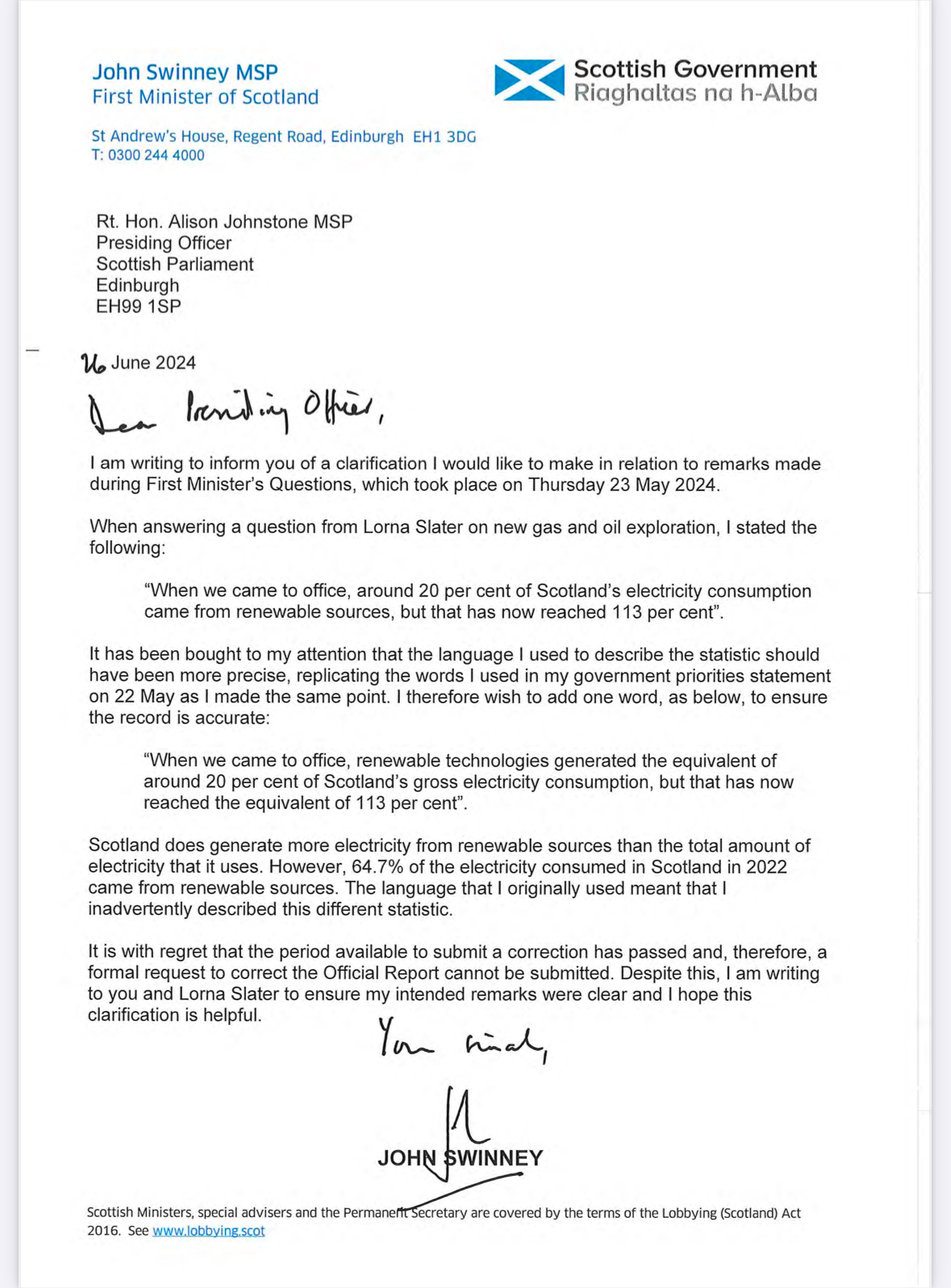
After the letters became public there was a discussion amongst officials about the drafting of a statement to send to a journalist who had asked some questions. That conversation, on 27th June 2024, provides further evidence to substantiate the impression that the UK Statistics Authority’s involvement was critical in making the correction happen.
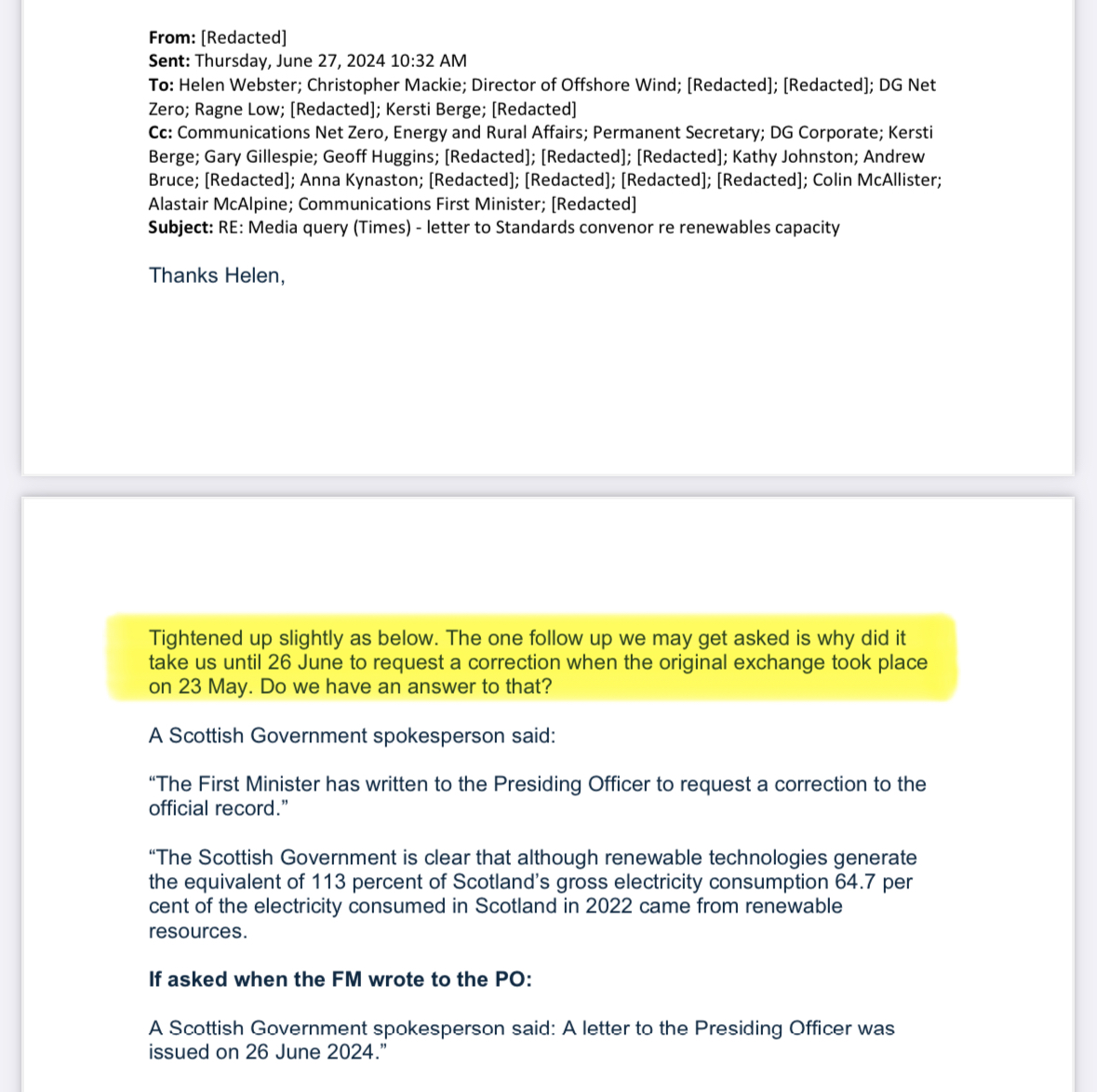
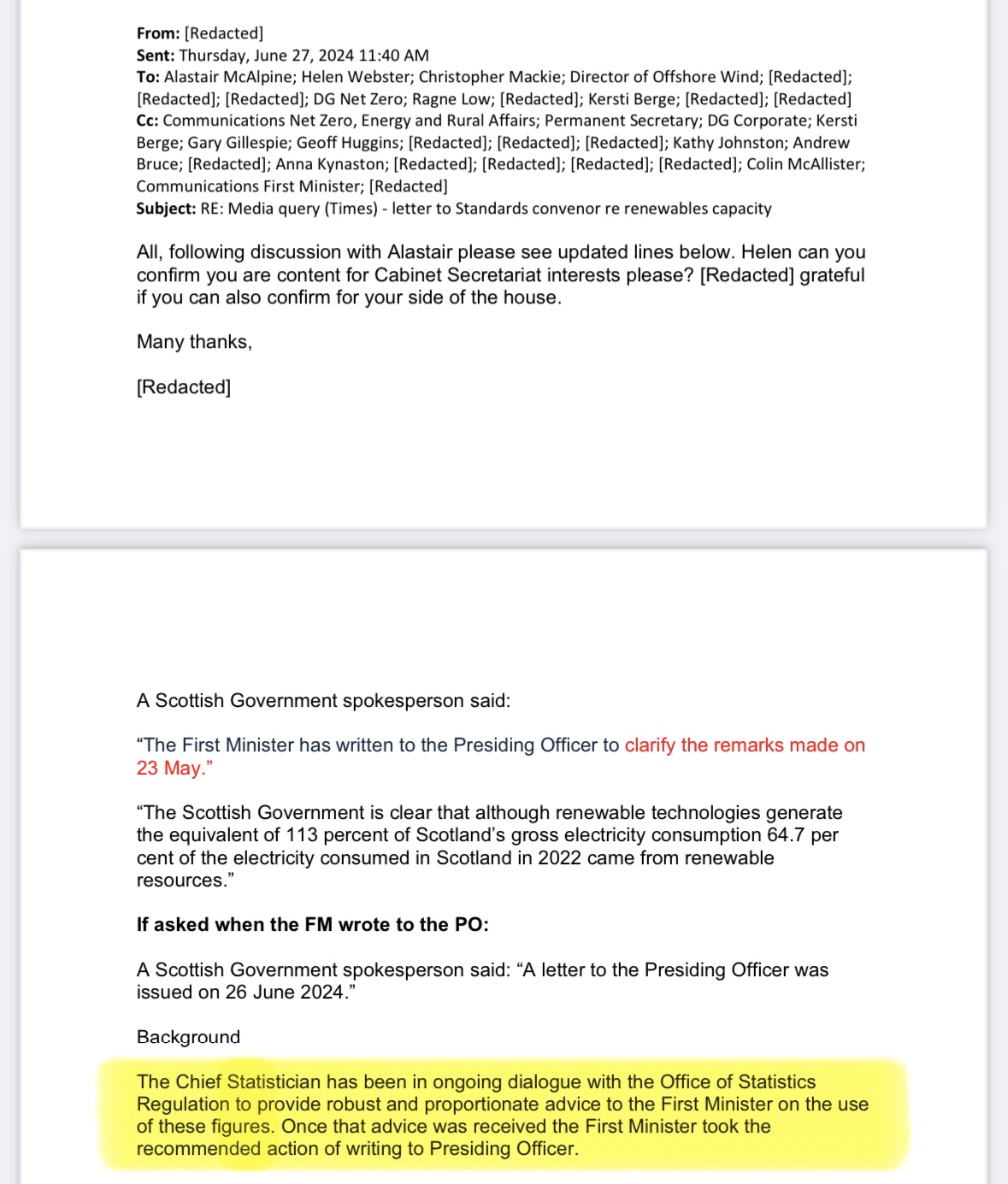
The “background” section was added after a suggestion that questions were likely to be asked about why it had taken so long for the First Minister to write the letters. But it conveniently omits the true explanation for the delay - that John Swinney had rejected the original advice from his officials to make a prompt correction.
There is one final noteworthy piece of correspondence. The Principal Private Secretary to the First Minister deserves some credit for pointing out that this was a correction, not a clarification.
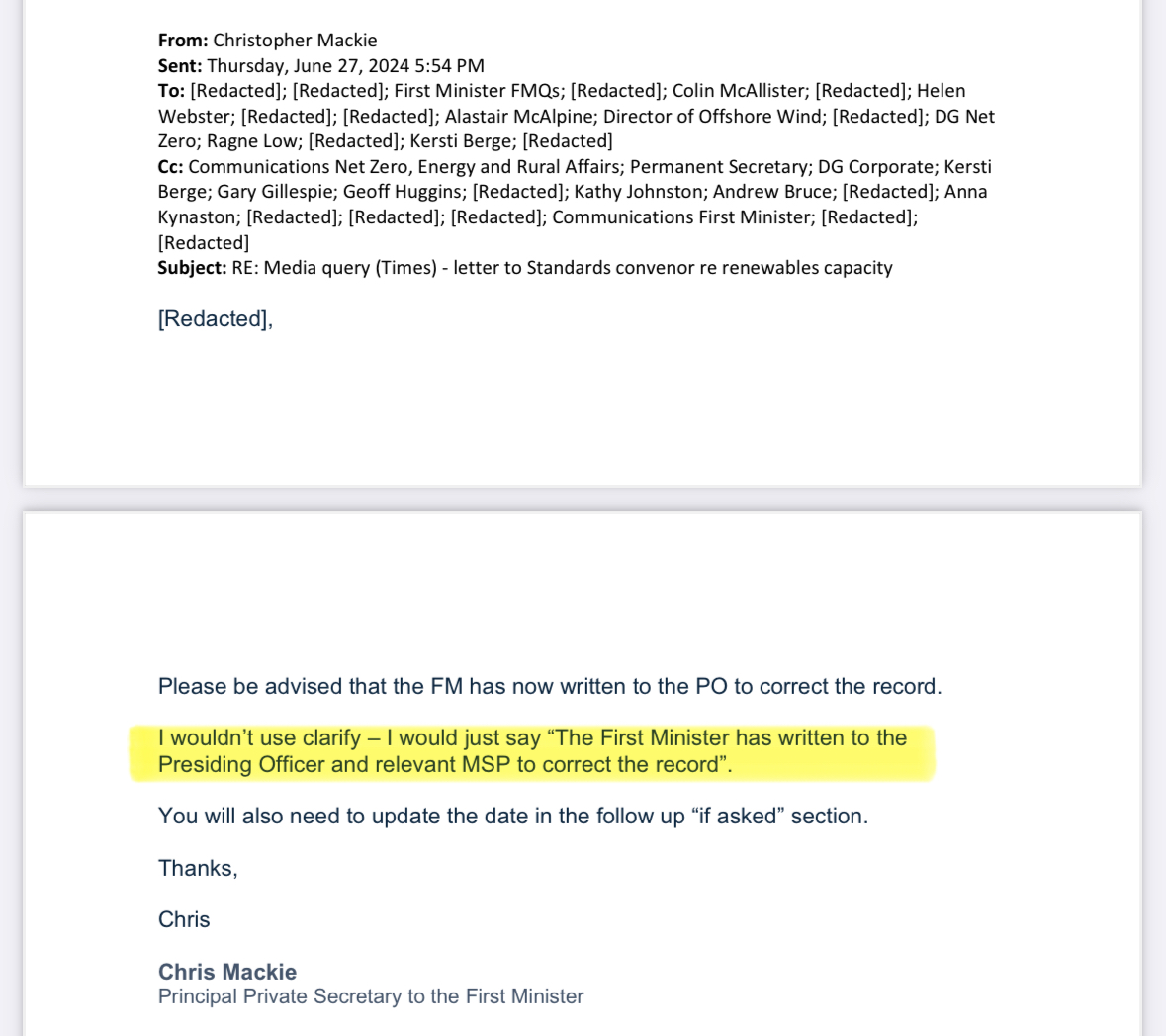
Postscript
You might be tempted to dismiss this as yesterday's news. Corrections, however grudgingly, have been made. Lessons have been learned.
But that simply isn't the case.
Just this week, Angus Robertson, the Cabinet Secretary for Constitution, External Affairs and Culture, was pushing the false statistic on social media:6https://x.com/angusrobertson/status/1884149497976025149?s=46&t=y9v1mXDn2DQJqjCpgZcKXg
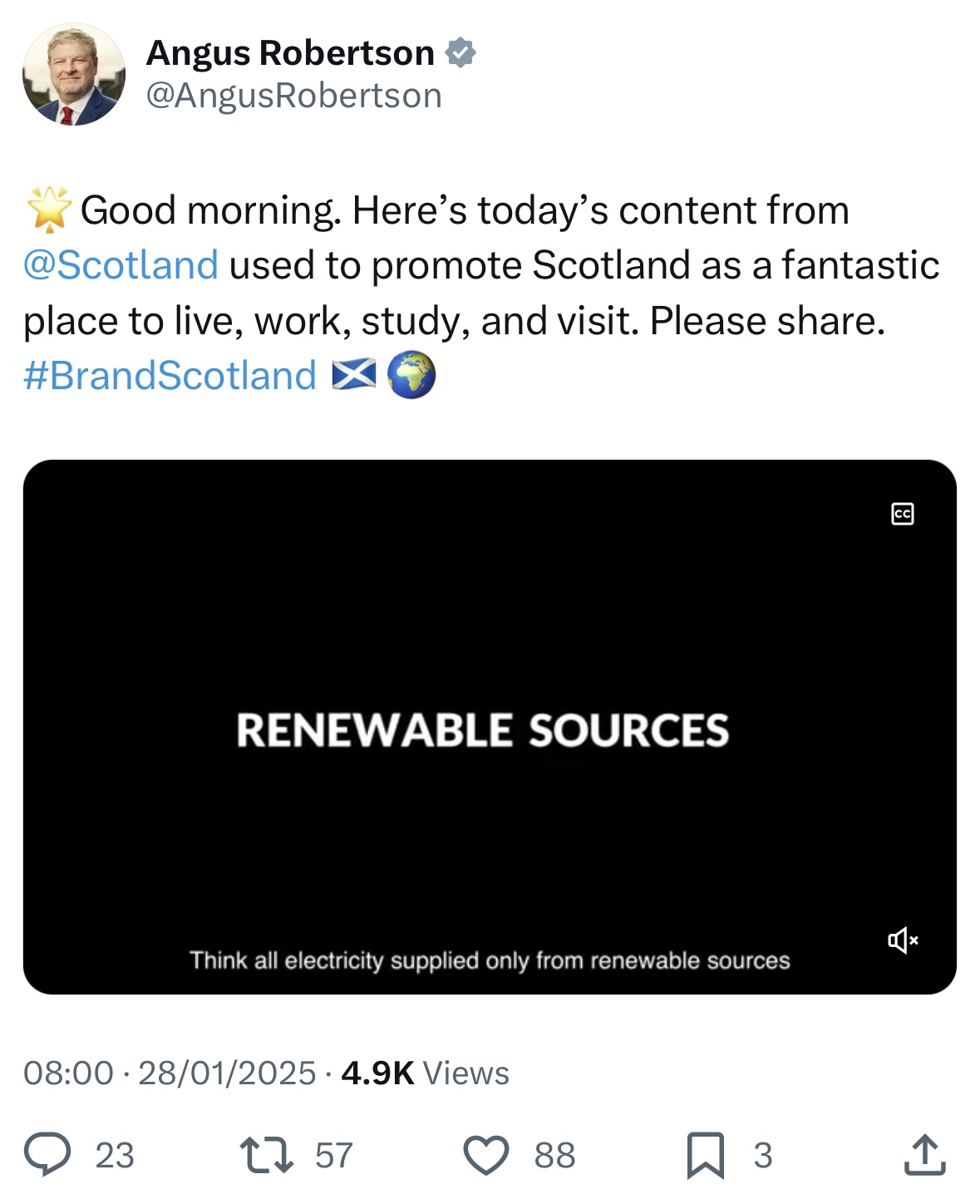
This is the pertinent excerpt from the video. An unambiguously false claim, in a promotional video produced by a Scottish Government agency, and promoted by a Cabinet Secretary:
Please log in to create your comment